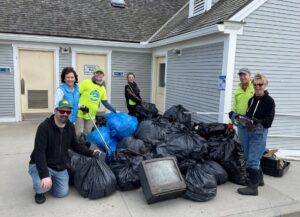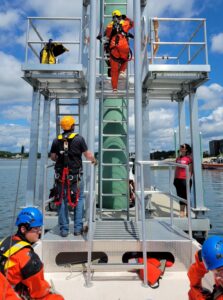
Mark Forest, who is a candidate for County Commissioner; Paul Niedzwiecki, Cape Cod Commission Executive Director; Patti Daley, Cape Cod Commission Deputy Director; Barnstable Town Councilor Ann Canedy talk during the release of the 208 Plan draft to stakeholders last Friday at Cape Cod Community College.
WEST BARNSTABLE – Several dozen stakeholders got an early look last week at a draft of the 208 Plan, the document that maps out the Cape’s response to wastewater pollution in its estuaries.
The Cape Cod Commission released the draft document.
The regional planning agency will schedule public meetings in all sections of the Cape to gather public comment this fall.
The following is the meeting schedule: September 10: Wellfleet Preservation Hall; September 23: Chatham Community Center; October 7: Cape Cod Commission in Barnstable; October 21: Mashpee Town Hall.
The stakeholder sessions will occur from 2 to 4 p.m. and the public comment period is from 4 to 6 p.m.
Falmouth Wastewater Superintendent Gerald Potamis said the challenge will be getting the plan through regulatory hurtles.
The comment period for the draft begins this week.
Public hearings will be held in each region of the Cape in September and October.
Section 208 of the U.S. Clean Water Act was designed to propose solutions for water quality problems from point–direct discharge to surface waters–and non-point–indirect discharge– sources within state-specified geographic regions.
Cape Cod is one such region in Massachusetts.
Among other planning activities, it was developed for the purpose of encouraging and facilitating the development and implementation of area-wide waste treatment management plans.
It requires state governors to identify areas with water quality problems and designate an entity to develop these area wide waste treatment management plans.
It is a planning effort similar to a land use master plan. It provides background assessment of water quality, establishes desired conditions, outlines policy goals to achieve those conditions, and identifies agencies responsible for implementing the plan.
The existing 208 Plan for Cape Cod was approved in September 1978 after two years of outreach and development by the Cape Cod Planning and Economic Development Commission. It has never been formally updated.
In the meantime, the understanding of the sources and impacts of nutrients and other non-point sources of pollution is vastly greater than in 1978, and the technology and tools available for water quality management is also well advanced, according to the Cape Cod Commission.
The same elements of the Clean Water Act will be the focus of the 208 Plan Update.
Water quality standards, beneficial uses, non-point source management, protection of drinking water, science and needs-based assessments and other principles of the 1978 Plan will be maintained.
Under Section 208, states are allowed to designate planning areas and the agency responsible for that planning. The Cape Cod Commission’s predecessor, the Cape Cod Planning and Economic Development Commission, was the designated agency for the initial plan, approved in 1978.
While the Cape Cod Commission was understood to be the regional agency under section 208 as the successor to CCPEDC, it was officially designated and directed to update the 1978 plan in January 2013.
The 208 program is a planning process, not a design and engineering process, Cape Cod Commission staff clarify about the 208 Plan. “Cape Cod towns are doing local work, assessing their own needs and arriving at potential solutions. The regional plan will incorporate these efforts, look at ways to share costs, operations or facilities, and propose ways to share costs equitably, with state and federal support.
In its Memorandum of Understanding with the Massachusetts Department of Environmental Protection, the Cape Cod Commission committed to producing a draft 208 Plan Update by June 2014. The Commission has 36 months from when work commenced in May 2013 to complete the update.
The Massachusetts Water Pollution Abatement Trust awarded a $3 million grant to the Cape Cod Commission in January 2013. In addition, the trust provided another $350,000 for further development of the innovative computer-modeling tool named Watershed MVP (Multi-Variant Planner).
A watershed approach looks at all of the contributing sources within a watershed, including surface and groundwater sources, without regard to political boundaries.
Of the 57 embayments on Cape Cod, 32 are shared by two or more towns.
Pond and estuary water quality problems on the Cape are a result of watershed-wide discharges of wastewater, fertilizers, stormwater and other pollutants to the groundwater. In many cases, partnerships between multiple towns sharing a watershed will be required to restore health of the impaired waters with the minimum amount of infrastructure and at the lowest cost.
The Section 208 Plan Update requires approval by the Massachusetts Department of Environmental Protection and the U.S. Environmental Protection Agency. The full membership of the Cape Cod Commission will be asked to approve the final plan prior to its submission for state and federal review.






















